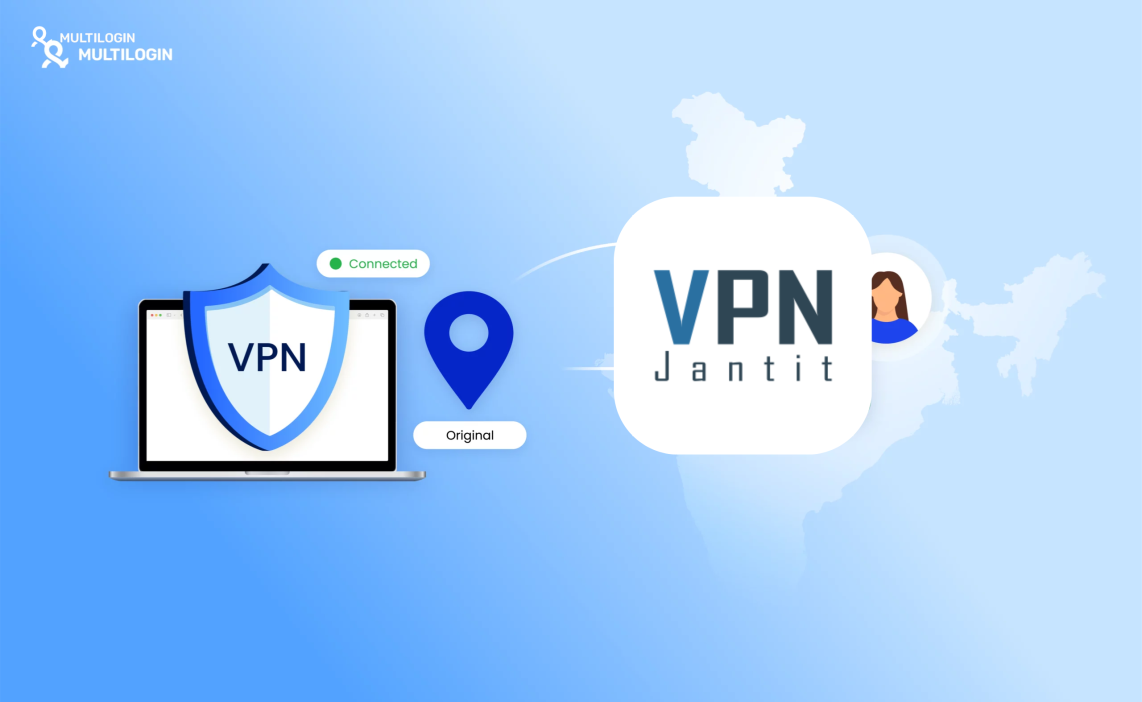VPNJantit has long been a familiar name in the world of free VPN and SSH access, especially among users in Southeast Asia, India, and regions where online censorship and geo-blocking are widespread.
Known for its no-frills interface and the ability to generate temporary VPN, SSH, Shadowsocks, and V2Ray accounts, VPNJantit offers a quick way to bypass restrictions — for free or at minimal cost.
But in 2025, the stakes are much higher. Websites no longer rely solely on IP detection. The web now operates with browser fingerprinting, behavioral analysis, real-time blacklists, and advanced device profiling.
And while VPNJantit might have served the purpose in its earlier years, the landscape has shifted.
So, the real question is: is VPNJantit still useful, reliable, or even safe in 2025? Or have privacy-focused users moved on to more robust alternatives like anti detect browsers, dedicated proxies, and identity isolation tools like Multilogin?
This comprehensive review answers exactly that — breaking down what VPNJantit offers, what it lacks, and what you should use instead if anonymity, stability, and stealth are your priority.
What Is VPNJantit?
VPNJantit is a web-based platform that provides temporary SSH, VPN, Shadowsocks, and V2Ray accounts. Unlike traditional VPN services like NordVPN or ExpressVPN that offer full apps, encrypted tunnels, kill switches, and support, VPNJantit operates more like an IP account generator.
Users can visit VPNJantit, select a server region (typically Singapore, United States, Germany, India, or Indonesia), and instantly create a login credential for:
- OpenVPN (TCP/UDP)
- SSH tunneling
- V2Ray/VLESS
- Shadowsocks
- Squid/HTTP Proxy
These accounts usually expire in 3 to 7 days. Some require port forwarding or external apps to work. The service is mostly unmanaged, and it relies on users configuring the connections themselves with apps like Bitvise, OpenVPN, or V2RayN.
VPNJantit is attractive because it’s free and doesn’t require identity verification. However, this very simplicity is also its biggest flaw — it offers minimal control, no encryption transparency, and no protection beyond the IP switch.
In an era of AI-driven surveillance, fingerprint-based detection, and automated banning systems, that’s simply not enough.
Pros of VPNJantit
Despite its dated infrastructure, VPNJantit has a few upsides that continue to make it appealing for basic use cases.
- Free Access: For users who don’t want to pay for a premium VPN, VPNJantit offers a variety of SSH and VPN accounts at no cost. This makes it ideal for short-term usage such as bypassing network filters at school, work, or while traveling.
- Regional IP Choices: It offers IPs from commonly requested regions, such as Singapore, Germany, the US, and Indonesia. This is particularly helpful for users looking to simulate access from those countries.
- V2Ray and Shadowsocks: VPNJantit supports protocols like V2Ray and Shadowsocks, which are known for their obfuscation capabilities. These tools are helpful in regions with deep packet inspection or heavy censorship, like China or Iran.
- SOCKS and HTTP Proxy Support: Some server options allow proxy tunneling, which gives users flexibility in how they route their traffic — especially helpful for apps that don’t support traditional VPNs.
- Quick Setup for Advanced Users: For those who are technically inclined, VPNJantit allows rapid configuration and server switching. It doesn’t require an account or long onboarding process, which can be a plus in certain scenarios.
Cons of VPNJantit in 2025
While VPNJantit may still offer temporary utility, it has fallen behind in almost every meaningful way when it comes to modern privacy, performance, and usability.
- No Encryption Transparency: There’s no clear documentation on encryption protocols or logs. While it offers SSH tunneling and OpenVPN, it’s unclear what ciphers or security standards are used.
- Poor UX and Manual Setup: Unlike modern VPNs that come with apps and smart auto-config, VPNJantit expects users to copy-paste hostnames, manually import configuration files, and handle all error troubleshooting on their own.
- Short Account Lifespan: Most VPN or SSH accounts expire in a few days. You constantly have to revisit the site to create a new account — a hassle for daily users.
- No Browser Fingerprint Protection: This is the most significant shortcoming. VPNJantit changes your IP but does nothing to hide your device fingerprint, behavior patterns, canvas data, or WebGL signature — all of which can still be used to identify and block you.
- No Session Isolation or Automation: VPNJantit cannot isolate sessions for different accounts. If you’re a social media manager, affiliate marketer, or dropshipper, you need to run 5–50 accounts with clean profiles. VPNJantit cannot help you with that.
- Stability and Speed Issues: Free services mean shared bandwidth. Expect server drops, throttling, and unreliable uptime during peak hours.
- Not Suitable for Multiaccounting or Business Use: If you’re managing ad campaigns, verifying multiple Google accounts, or scraping data, you need stable IPs with browser profile isolation. VPNJantit simply wasn’t built for this level of complexity.
VPNJantit vs Anti Detect Browsers: A Modern Comparison
A few years ago, changing your IP was enough to access a blocked website or register a new account. But in 2025, websites are smarter.
They now use:
- Canvas fingerprinting
- Audio fingerprinting
- Device consistency checks
- TLS/JA3 fingerprinting
- Browser plugin and font analysis
That’s why modern users are turning to anti detect browsers like Multilogin.
What is an Anti Detect Browser?
An anti detect browser lets you create multiple isolated browser environments, each with its own fingerprint, cookies, timezone, language, and proxy. This allows you to operate as if you’re using different devices — even from the same computer.
Key Advantages Over VPNJantit:
- Each browser profile looks like a real, separate user
- Supports automation (e.g., Puppeteer, Selenium)
- Assign different proxies per profile
- Built-in fingerprint spoofing
- Team access and cloud sync options
Multilogin users can safely run dozens (or hundreds) of accounts without getting flagged, suspended, or banned — because both the IP and browser fingerprint are customized.
VPNJantit, on the other hand, only changes the IP — and that’s no longer enough.
Best VPNJantit Alternatives in 2025
If you’re looking for more advanced, secure, and scalable privacy solutions, here are better options:
1. Multilogin
Best-in-class antidetect browser for stealth browsing, multiaccounting, automation, and business use. Includes cloud-based session management and proxy rotation.
Use cases:
- Dropshipping stores
- Affiliate marketing
- Facebook Ads, Google Ads
- Influencer management
2. Nodemaven
Nodemaven provides fast, rotating residential proxies baked directly into Multilogin. Eliminates the need for third-party proxy setups and works out of the box.
Use cases:
- Web scraping
- Anonymous browsing
- Avoiding IP bans
- Ad verification
3. Smartproxy / SOAX
Smartproxy and SOAX are enterprise-level proxy services with access to millions of residential IPs. Useful for users who already use anti detect browsers.
Use cases:
- Price comparison
- SEO tools
- Localized content testing
4. Tor Browser
Good for basic anonymity and bypassing regional censorship. Too slow for commercial use or session-dependent tasks.
Use cases:
- Anonymous research
- Accessing news in restricted countries
Ready to Try the Best? No Risk, Big Upside
Why settle for half-measures or take risks with your privacy and accounts?
Frequently Asked Questions About VPNJantit Review
Yes, VPNJantit offers free SSH, OpenVPN, Shadowsocks, and V2Ray accounts for short durations (usually 3–7 days). However, this comes with limitations in security, stability, and anonymity.
Not reliably. VPNJantit’s IPs are often blocked by streaming services like Netflix, Hulu, and Disney+. You’re better off using residential proxies with geo-targeting or anti detect browsers paired with clean IPs.
No. Because VPNJantit doesn’t guarantee encryption standards or session security, it’s not recommended for logging into financial or personal accounts.
You shouldn’t. VPNJantit lacks browser fingerprint protection, and using it for sensitive or high-risk platforms will likely lead to account bans. Tools like Multilogin are designed for that use case.
Multilogin (for browser fingerprint protection), Nodemaven (for built-in residential proxy traffic), and Smartproxy/SOAX (for large, clean IP pools). Tor is also useful for research, but not business automation.
Technically yes, but it’s not recommended due to the instability and short life span of the IPs. Using dedicated proxy providers that integrate directly with tools like Multilogin is a more stable and secure option.
Final Verdict: Is VPNJantit Still Worth It?
If you’re a casual user who needs quick, free access to a different IP — and you don’t mind setting up SSH or V2Ray manually — VPNJantit might still be useful for a day or two.
But for any professional, marketing, or business-related use, it’s outdated.
Modern platforms detect far more than IPs. They analyze how your browser behaves, what fonts are installed, and what screen resolution you use. VPNJantit simply isn’t built to compete in this environment.
If your goal is anonymity, stability, and account safety — tools like Multilogin are built for exactly that.



